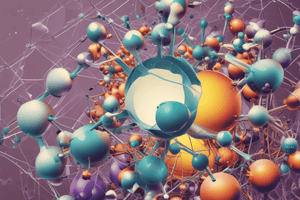Podcast
Questions and Answers
Which of the following is true about the boiling points of alkyl halides compared to hydrocarbons of similar molecular mass?
Which of the following is true about the boiling points of alkyl halides compared to hydrocarbons of similar molecular mass?
- The boiling points of alkyl halides cannot be compared to hydrocarbons.
- The boiling points of alkyl halides are generally lower than hydrocarbons.
- The boiling points of alkyl halides are generally higher than hydrocarbons. (correct)
- The boiling points of alkyl halides are the same as hydrocarbons.
Which of the following best describes the trend in boiling points of different alkyl halides?
Which of the following best describes the trend in boiling points of different alkyl halides?
- Boiling points increase with an increase in the size and mass of the alkyl group.
- Boiling points remain constant regardless of the size and mass of the alkyl group.
- Boiling points cannot be compared for different alkyl halides.
- Boiling points decrease with an increase in the size and mass of the alkyl group. (correct)
Which of the following best describes the intermolecular forces of attraction in alkyl halides?
Which of the following best describes the intermolecular forces of attraction in alkyl halides?
- Alkyl halides have weaker intermolecular forces compared to hydrocarbons.
- Alkyl halides have the same intermolecular forces as hydrocarbons.
- Alkyl halides do not have intermolecular forces.
- Alkyl halides have stronger intermolecular forces compared to hydrocarbons. (correct)
Which of the following is true about the physical state of chlorofluoromethanes at room temperature?
Which of the following is true about the physical state of chlorofluoromethanes at room temperature?
Which of the following is true about the polarity of organ halogen compounds?
Which of the following is true about the polarity of organ halogen compounds?
Flashcards are hidden until you start studying
Study Notes
Boiling Points of Alkyl Halides vs. Hydrocarbons
- Alkyl halides exhibit higher boiling points compared to hydrocarbons of similar molecular mass due to stronger intermolecular forces.
- The presence of polar bonds in alkyl halides increases dipole-dipole interactions, contributing to elevated boiling points.
Trend in Boiling Points of Alkyl Halides
- Boiling points of alkyl halides generally increase with the size of the halogen, as larger halogens lead to stronger van der Waals forces.
- Fluoroalkanes possess lower boiling points compared to other halogenated compounds of similar structure due to the weaker dipole-dipole interactions associated with fluorine.
Intermolecular Forces of Attraction in Alkyl Halides
- Alkyl halides primarily experience dipole-dipole interactions because of their polar C-X bonds (where X is a halogen).
- London dispersion forces also play a role, but significantly weaker than dipole-dipole interactions in the case of polar alkyl halides.
Physical State of Chlorofluoromethanes at Room Temperature
- Chlorofluoromethanes are typically found as gaseous or low-boiling liquid substances at room temperature due to their relatively low molecular weights and resultant boiling points.
Polarity of Organ Halogen Compounds
- Organ halogen compounds generally exhibit significant polarity owing to the electronegativity difference between carbon and halogen atoms.
- The polarity influences reactivity and solubility, enabling these compounds to interact with polar solvents but making them less soluble in nonpolar environments.
Studying That Suits You
Use AI to generate personalized quizzes and flashcards to suit your learning preferences.




